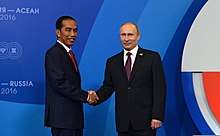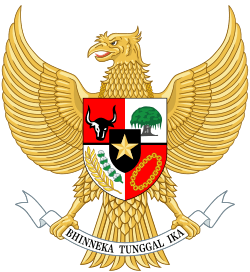Indonesia–Russia relations
Indonesia–Russia relations (Indonesian: Hubungan Indonesia dengan Rusia, Russian: Российско-индонезийские отношения) refers to bilateral foreign relations between Indonesia and Russia. Russia has an embassy in Jakarta, and Indonesia has an embassy in Moscow along with a consulate general in Saint Petersburg. Both countries are members of the APEC and G-20.
 | |
Indonesia |
Russia |
|---|---|

According to a 2018 Pew Research Center poll, 46% of Indonesians have a favourable view of Russia, with 31% expressing a negative view.[1]
History
The Soviet Union established diplomatic relations with Indonesia in 1950 and is one of the very few countries to recognize Indonesia's independence from the Netherlands after the end of World War II.

Early in the Cold War, both countries had robust relations, with Indonesian president Sukarno visiting Moscow and Soviet leader Nikita Khrushchev visiting Jakarta. When Sukarno was overthrown by General Suharto, relations between the two states deteriorated, likely due to Indonesia's anti-communist policy under Suharto following the 1965 unrest. However, unlike relations with China during Suharto's rule, diplomatic relations were not suspended and remained intact. During this time, Indonesia is also one of many countries that boycotted the 1980 Summer Olympics held in Moscow. Relations had been reported to be deteriorated further during the early days of Suharto's presidency due to widespread ideological stigma, and Indonesia became increasingly pro-Western in foreign and economic relations at the time.
Following the 1979 Soviet–Afghan War, Indonesia's negative views of the Soviet Union significantly increased, with many Indonesians claiming it as a "communist crime against Muslims".
In the 1980s, President Suharto visited the Soviet Union for the first time.
The USSR under Mikhail Gorbachev began to develop closer ties with Indonesia alongside other Southeast Asian countries, and relations between were improving once again since the formation of the modern-day Russian Federation. Under Boris Yeltsin and later Vladimir Putin, relations were generally stable and continued to the presenting for Fully Mutual cooperation to understanding between two countries to forging the Special relationship from the Presidency of Megawati Soekarnoputri until the present.
Country comparison
| Country | ||
|---|---|---|
| Area | 2,098,983 square kilometres (810,422 sq mi) | 17,124,442 square kilometres (6,611,784 sq mi) |
| Population | 273,529,998(2020) | 146,409,221 (2020) |
| Pop. density | 159 inhabitants per square kilometre (410/sq mi) | 8.2 inhabitants per square kilometre (21/sq mi) |
| Capital | ||
| Largest city | Jakarta – 12,359,445(30,458,553 Metro) | Moscow – 12,142,322 (17,049,522 Metro) |
| Government | Unitary presidential constitutional republic | Federal semi-presidential constitutional republic |
| Language(s) | Indonesian (official) | Russian (official) |
| Religions | 87.2% Islam, 9.9% Christianity, 1.7% Hinduism, 0.7% Buddhism, 0.2% Confucianism | 47.1% Christianity, 43.5% Irreligious, 6.6% Islam, 1.3% Paganism, 0.5% Buddhism |
| Ethnic groups | 42.6% Javanese, 15.4% Sundanese, 3.4% Malays, 3.3% Madurese, 3% Batak, 2.7% Minangkabau, 2.5% Betawi, 2.4% Bugis, etc. | 80.9% Russians, 3.9% Tatars, 1.4% Ukrainians, 1.1% Bashkirs, 1.0% Chuvashes, 1.0% Chechens, etc. |
| GDP | $1.074 trillion (nominal, 2018); $3.492 trillion (PPP, 2018) | $1.579 trillion (nominal, 2017); $4.007 trillion (PPP, 2017) |
| GDP per capita | $4,051 (nominal, 2018); $13,162 (PPP, 2018) | $10,608 (nominal, 2017); $27,899 (PPP, 2017) |
| GDP growth rate | 5.1% (2017) | 2.3% (2018) |
| Main industries | Palm oil, coal, petroleum, textiles | Petroleum, natural gas, coal, chemicals |
| Labor force | 125 million (2016) | 77 million (2017) |
| HDI | 0.707 (High) | 0.824 (Very high) |
Contemporary relationship
.jpg)
In late 2007, Indonesia purchased military weapons from Russia with long term payment. Indonesian airlines also were considering purchasing the Sukhoi Superjet 100 from Russia, but a 2012 demonstration crash has put such talks on hold. Indonesia now says it could take as long as a year to analyze the flight data recorder recovered from the crash site.[2] Separately, relations between the two countries are generally positive and stable, with seemingly improving contemporary and economic ties. Many Indonesians commonly perceive Russia as a country with whom they should cooperate more and develop closer ties.
According to the Russian defence ministry, on 7 December 2017 two nuclear-capable Tu-95 strategic bombers flew a patrol based from Biak Island in Papua, Indonesia.[3] The Russian commander stated the navigation exercises were for the purpose of checking the accuracy of long-distance flying over the seas.[4][5]
Military cooperation
Russia is a major arms supplier to Indonesia. Russian arms exports to Indonesia include the Sukhoi Su-30, Sukhoi Su-27, Mil Mi-35, BMP-3, Mil Mi-17, and Sukhoi Su-35.
See also
References
- "Image of Putin, Russia Suffers Internationally". Pew Research Center. December 6, 2018.
- "Indonesia Predicts Slow Probe of Crashed Russian Jetliner". Retrieved 16 May 2006.
- "Russian strategic bombers fly patrol mission from Indonesia". Fox News. 7 December 2017. Retrieved 9 December 2017.
- "Russia and Indonesia hold military exercise in Papua". Radio New Zealand. 7 December 2017. Retrieved 9 December 2017.
- "Russian military personnel arrive in Biak for navigation exercises". The Jakarta Post. Retrieved 9 December 2017.

